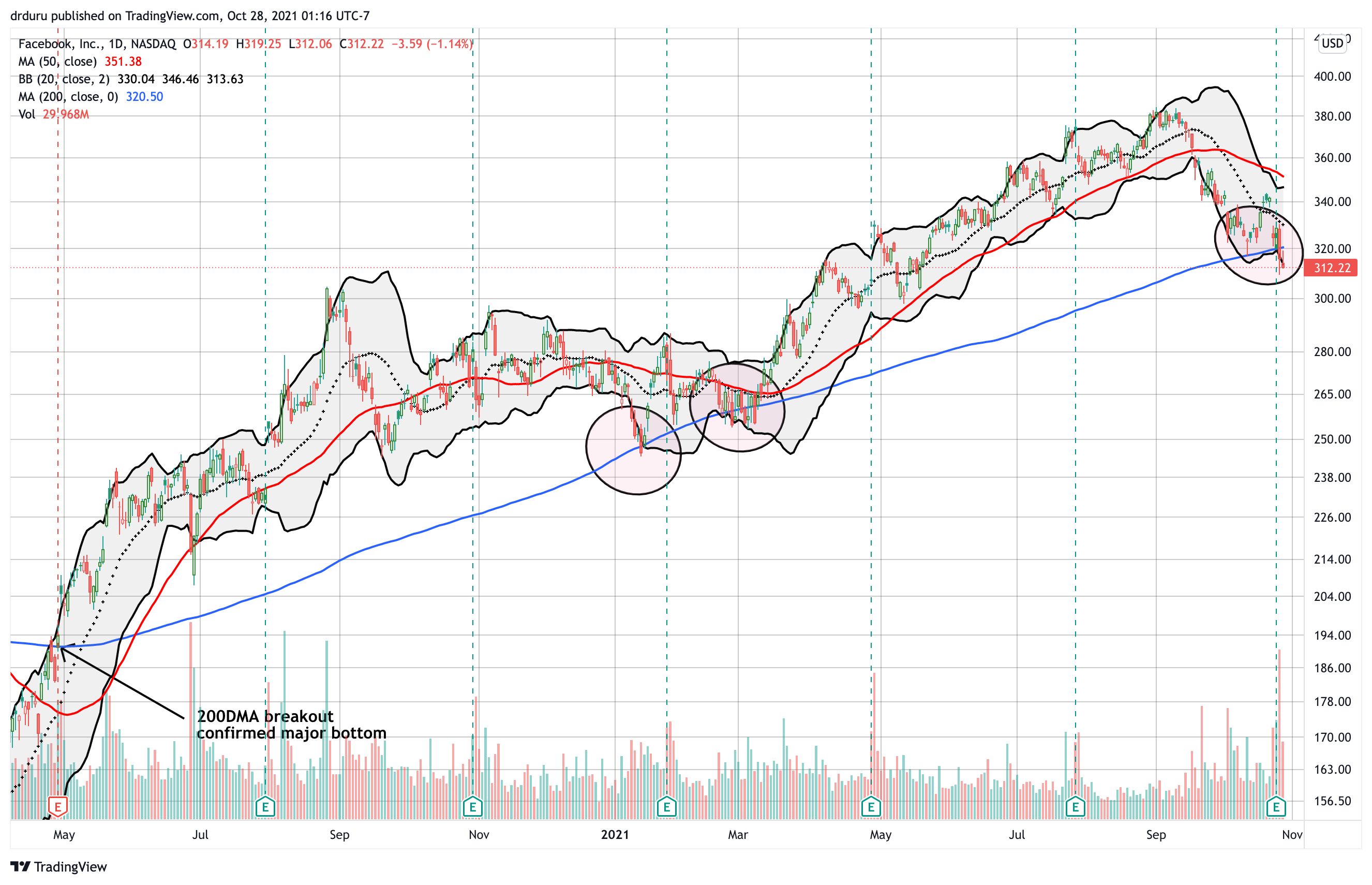The stock market issued its verdict for Facebook (FB). The beleaguered company reported Q3 earnings, and sellers pressed their bets into a key technical breakdown. FB closed at a 5-month low and below support at its 200-day moving average (DMA) (the blue line below). This event is important because FB has spent so little time below its 200DMA since its rebound from the 2020 stock market collapse. Since the April 29, 2020 200DMA breakout, FB has closed below its 200DMA just 9 days in three different periods….including the current one. This predictable pattern helped generate the overall predictable pattern in the S&P 500 (SPY) that provided just brief tests of 50DMA support. The well-defined pattern also provides a definitive trading guide for bulls and bears alike.

The Trade
FB is a short as long as it trades below its 200DMA. My short position here is a bet that this time will be different. That is, the stock has better than a 50/50 chance of exceeding previous 200DMA breakdowns.
Previous history suggests FB will spend little time in this bearish territory. For FB buyers, a close above the 200DMA should provide a major refresh of the bullish uptrend. The uptrend has strong support from Facebook’s repurchase activity. From the earnings report: “We repurchased $14.37 billion of our Class A common stock in the third quarter and had $7.97 billion remaining on our prior share repurchase authorization as of September 30, 2021. We also announced today a $50 billion increase in our share repurchase authorization.”
The Challenges
Until the repurchase backstop warms up, investors are left with several concerns. Facebook wrapped its guidance for Q4 with several challenges: “…continued headwinds from Apple’s iOS 14 changes, and macroeconomic and COVID-related factors. In addition, we expect non-ads revenue to be down year-over-year in the fourth quarter as we lap the strong launch of Quest 2 during last year’s holiday shopping season.”
The prepared remarks from the earnings conference call (transcript from Seeking Alpha), provided more details on the headwinds:
- “Advertising spend was negatively impacted by performance in measurement headwinds related to Apple’s changes…
- We are seeing some macro headwinds as growth in online commerce has moderated from the elevated levels experienced earlier in the pandemic, and businesses faced supply chain disruptions…
- COVID resurgences in Southeast Asia have led to additional lockdowns in a curtailment of economic activity.”
Facebook also faces a major market challenge from TikTok. The battle is fierce enough to force Facebook to pivot away from its core base of older users. From the conference call:
“…competition has also gotten a lot more intense, especially with Apple’s iMessage growing in popularity. And more recently, the rise of TikTok, which is one of the most effective competitors that we have ever faced. So we are retooling our team to make serving the young adults their north star rather than optimizing for the larger number of older people…This shift will take years, not months to fully execute.”
Since older users are worth more to advertisers (higher incomes and greater spending), Facebook will likely face lower monetization rates for its user base. Given the intense competition for the time of younger audiences, Facebook could actually fail in its efforts.
The Spending
Moreover, Facebook is ramping up spending as it invests heavily in its Facebook Reality Labs (FRL). As a result, operating profit for 2021 will decline by $10B. CEO Mark Zuckerberg also anticipates these expenses to grow “for each of the next several years.”
Expense growth for Q3 out-stripped the 35% year-over-year revenue growth. Total expenses increased 38% year-over-year. Specifically:
- “Cost of revenue increased 38% driven mostly by consumer hardware costs
- Core infrastructure investments, and payments to partners. R&D increased 33%, driven primarily by hiring to support our core products and consumer hardware efforts.
- Marketing and sales increased 32%, mainly driven by marketing spend in higher-end.
- G&A expenses increased 65% driven primarily by higher legal-related costs and employee related costs.”
The Response
In other words, Facebook investors will need to exercise patience in the coming years as the company wrestles down a multitude of challenges. Of course, the biggest cloud remains the questions about Facebook’s impact on society as a whole. From Zuckerberg in the conference call:
“Good, safe criticism helps us get better, but my view is that what we’re seeing is a coordinated effort to selectively use leaked documents to paint a false picture of our Company. The reality is that we have an open culture where we encourage discussion and research about our work so we can make progress on many complex issues that are not specific to just us.
We have an industry leading programs to study the effects of our products and provide transparency into our progress because we care about getting this right. When we make decisions, we need to balance competing social [values] (ph), like free expression with reducing harmful content, or enabling strong encrypted privacy with supporting law enforcement or enabling research and interoperability with locking down data as much as possible.
It makes a good sound bite to say that we don’t solve these impossible trade-offs because we’re just focused on making money. But the reality is these questions are not primarily about our business, but about balancing different — difficult social values. And I’ve repeatedly called for regulation to provide clarity because I don’t think companies should be making so many of these decisions ourselves.”
Be careful out there!
Full disclosure: short FB, long FB put spread
